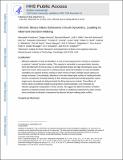| dc.contributor.author | Friedman, Alexander | |
| dc.contributor.author | Homma, Daigo | |
| dc.contributor.author | Bloem, Bernard | |
| dc.contributor.author | Gibb, Leif G. | |
| dc.contributor.author | Amemori, Ken-ichi | |
| dc.contributor.author | Hu, Dan | |
| dc.contributor.author | Delcasso, Sebastien | |
| dc.contributor.author | Truong, Timothy F. | |
| dc.contributor.author | Yang, Joyce C | |
| dc.contributor.author | Hood, Adam S. | |
| dc.contributor.author | Mikofalvy, Katrina A. | |
| dc.contributor.author | Beck, Dirk W. | |
| dc.contributor.author | Nguyen, Norah | |
| dc.contributor.author | Nelson, Erik | |
| dc.contributor.author | Toro Arana, Sebastian | |
| dc.contributor.author | Vorder Bruegge, Ruth H. | |
| dc.contributor.author | Goosens, Ki Ann | |
| dc.contributor.author | Graybiel, Ann M | |
| dc.date.accessioned | 2020-08-25T19:00:53Z | |
| dc.date.available | 2020-08-25T19:00:53Z | |
| dc.date.issued | 2017-11 | |
| dc.identifier.issn | 0092-8674 | |
| dc.identifier.uri | https://hdl.handle.net/1721.1/126804 | |
| dc.description.abstract | Effective evaluation of costs and benefits is a core survival capacity that in humans is considered as optimal, “rational” decision-making. This capacity is vulnerable in neuropsychiatric disorders and in the aftermath of chronic stress, in which aberrant choices and high-risk behaviors occur. We report that chronic stress exposure in rodents produces abnormal evaluation of costs and benefits resembling non-optimal decision-making in which choices of high-cost/high-reward options are sharply increased. Concomitantly, alterations in the task-related spike activity of medial prefrontal neurons correspond with increased activity of their striosome-predominant striatal projection neuron targets and with decreased and delayed striatal fast-firing interneuron activity. These effects of chronic stress on prefronto-striatal circuit dynamics could be blocked or be mimicked by selective optogenetic manipulation of these circuits. We suggest that altered excitation-inhibition dynamics of striosome-based circuit function could be an underlying mechanism by which chronic stress contributes to disorders characterized by aberrant decision-making under conflict. | en_US |
| dc.description.sponsorship | National Institute of Mental Health (Grant R01 MH060379) | en_US |
| dc.description.sponsorship | CHDI Foundation (Award A-5552) | en_US |
| dc.description.sponsorship | Army Research Office (Contract W911NF-10-1-0059) | en_US |
| dc.language.iso | en | |
| dc.publisher | Elsevier BV | en_US |
| dc.relation.isversionof | http://dx.doi.org/10.1016/j.cell.2017.10.017 | en_US |
| dc.rights | Creative Commons Attribution-NonCommercial-NoDerivs License | en_US |
| dc.rights.uri | http://creativecommons.org/licenses/by-nc-nd/4.0/ | en_US |
| dc.source | PMC | en_US |
| dc.title | Chronic Stress Alters Striosome-Circuit Dynamics, Leading to Aberrant Decision-Making | en_US |
| dc.type | Article | en_US |
| dc.identifier.citation | Friedman, Alexander et al. "Chronic Stress Alters Striosome-Circuit Dynamics, Leading to Aberrant Decision-Making." Cell 171, 5 (November 2017): P1191-1205.e28 © 2017 Elsevier | en_US |
| dc.contributor.department | McGovern Institute for Brain Research at MIT | en_US |
| dc.contributor.department | Massachusetts Institute of Technology. Department of Brain and Cognitive Sciences | en_US |
| dc.relation.journal | Cell | en_US |
| dc.eprint.version | Author's final manuscript | en_US |
| dc.type.uri | http://purl.org/eprint/type/JournalArticle | en_US |
| eprint.status | http://purl.org/eprint/status/PeerReviewed | en_US |
| dc.date.updated | 2019-10-01T17:45:23Z | |
| dspace.date.submission | 2019-10-01T17:45:30Z | |
| mit.journal.volume | 171 | en_US |
| mit.journal.issue | 5 | en_US |
| mit.metadata.status | Complete | |
